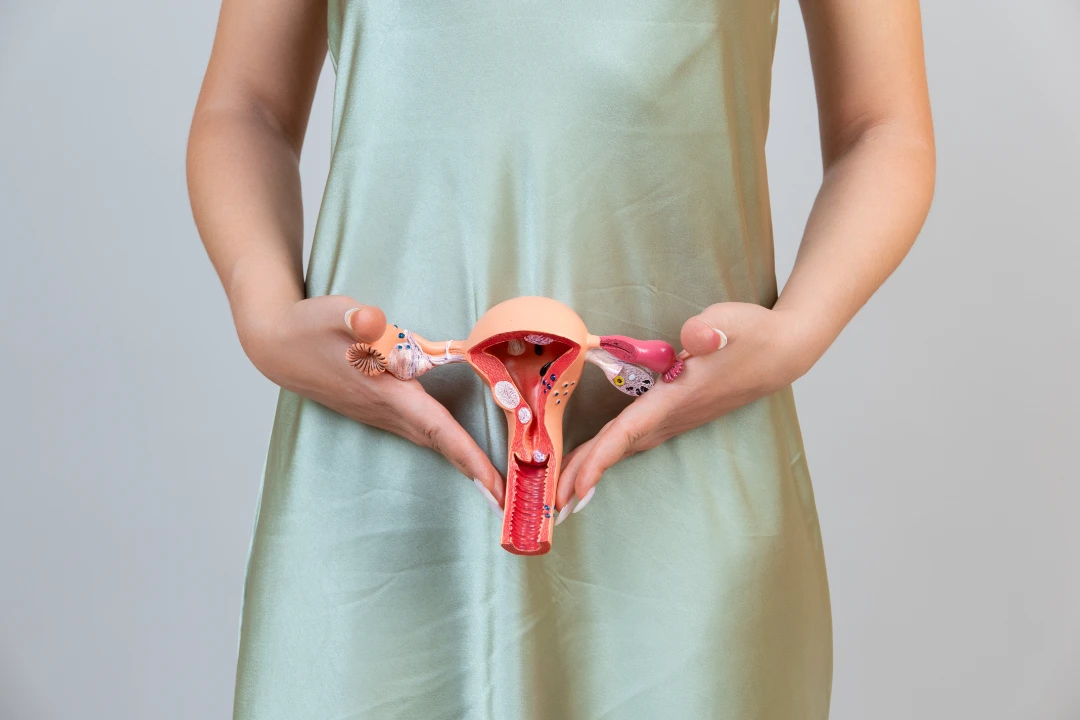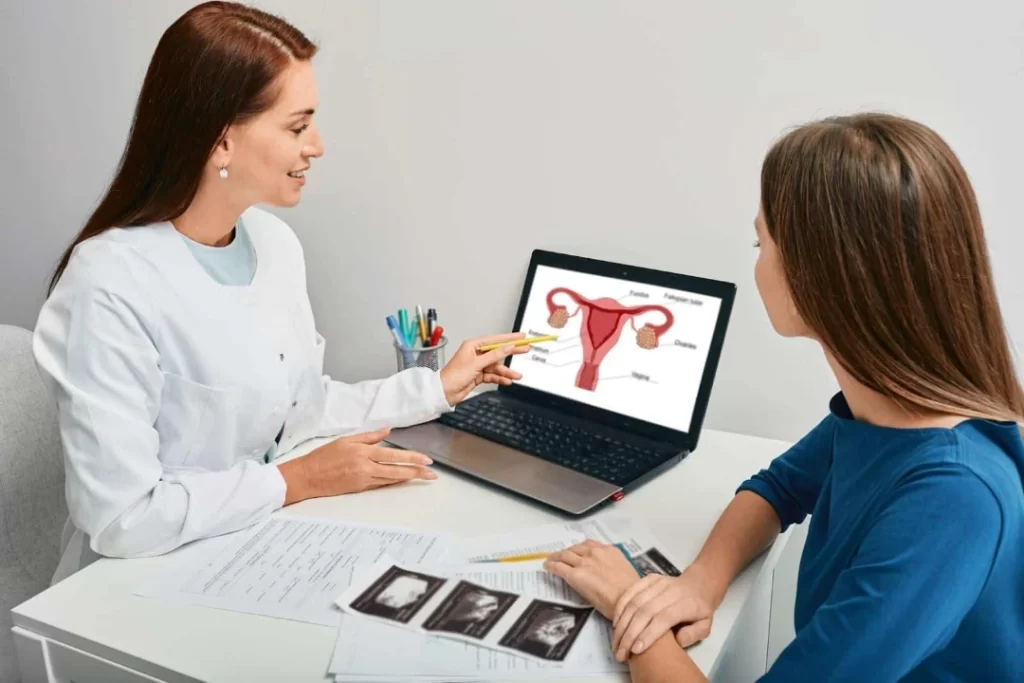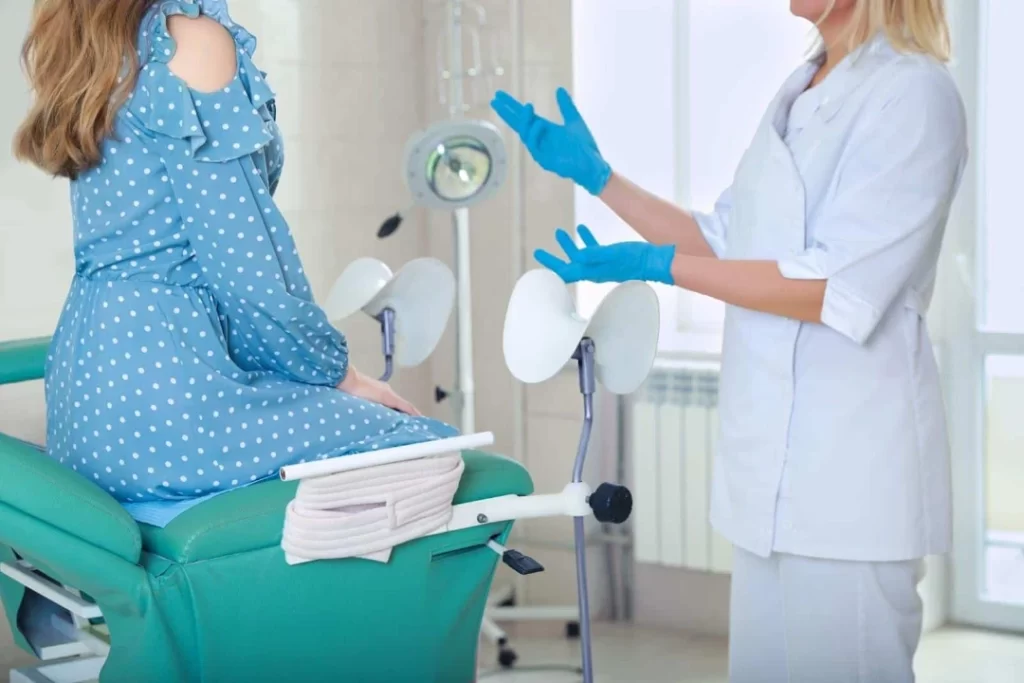Being told you have an ovarian cyst often leaves you with more questions than […]

Your first gynaecological visit is an essential step in taking charge of your reproductive health. While it’s normal to feel a bit anxious or unsure, understanding the significance of this visit can help you approach it with confidence. This isn’t just a routine check-up; it’s an opportunity to establish a baseline for your health, address any questions or concerns, and build a relationship with a healthcare provider who can support you through all stages of life.
Many young women worry about what will happen during the visit, often fearing pain, discomfort, or embarrassment. However, it’s important to know that gynaecologists are trained professionals who prioritise your comfort. Your first visit may involve a conversation about your health history, menstrual cycle, and any specific concerns you have. Physical exams, if necessary, are usually straightforward and will be explained to you every step of the way.
Remember, this visit is a normal and essential part of women’s healthcare, regardless of whether you’re experiencing issues or are sexually active. Starting early with regular gynaecological visits can help you stay informed and proactive about your health. By making this first appointment, you’re taking a positive step toward a lifetime of well-being.
In this article, we will discuss why you shouldn’t delay your first gynaecological visit, what to expect during the exam, how to prepare, and what questions to ask, so you can approach your first visit with confidence and ease.

Delaying your first gynaecological appointment can have significant implications for your long-term health. Early gynaecological care is essential not only for addressing immediate concerns but also for establishing a foundation of proactive and preventive health practices that can benefit you throughout your life.
Despite the importance of early care, many young women delay their first gynaecological visit for various reasons. One of the most common reasons is fear or anxiety about the unknown—worrying that the visit will be painful, embarrassing, or uncomfortable. There’s also a widespread misconception that gynaecological care is only necessary once a woman becomes sexually active, leading some to postpone their first visit unnecessarily.
Others might delay because they feel that their symptoms are not serious enough to warrant a visit or because they feel embarrassed discussing intimate health issues with a doctor. Additionally, cultural or familial beliefs may play a role in postponing the first appointment, as some young women may receive mixed messages about the importance of reproductive health care.
It’s crucial to recognise that these fears and misconceptions, while common, shouldn’t prevent you from taking charge of your health. Gynaecologists are trained to handle these situations with care and professionalism, and they ensure that you feel comfortable and informed throughout the process.
Early gynaecological care is a vital part of maintaining your overall health and well-being. A gynaecologist can help you manage various aspects of reproductive health, from understanding your menstrual cycle to discussing birth control options and screening for potential health issues. Starting these visits early allows your gynaecologist to identify any underlying conditions that may not present symptoms immediately but could lead to complications if left untreated.
For instance, conditions like polycystic ovary syndrome (PCOS), endometriosis, or sexually transmitted infections (STIs) might not always have obvious symptoms in their early stages but can impact your reproductive health if not addressed promptly. Regular visits also provide an opportunity for cancer screenings, such as Pap smears and HPV tests, which can detect precancerous changes in the cervix long before they develop into more serious conditions.
Moreover, early visits also provide an opportunity to establish a relationship with your gynaecologist, which can make it easier to discuss sensitive topics openly. This trust and familiarity can make future visits less intimidating and more productive, as your gynaecologist becomes a trusted partner in your health care.
Additionally, early gynaecological care helps you establish healthy habits that can support your overall well-being. Whether it’s understanding how to manage your menstrual cycle, learning about safe sexual practices, or exploring contraception options, these early conversations lay the groundwork for a lifetime of informed health decisions.
Deciding when to schedule your first gynaecological visit is a crucial step in taking charge of your reproductive health. While the timing can vary depending on individual circumstances, there are general guidelines and recommendations from leading health organizations that can help you determine the right time for your first appointment.
The American College of Obstetricians and Gynaecologists (ACOG) [1] recommends that young women schedule their first gynaecological visit between the ages of 13 and 15. This initial visit often serves as an introductory meeting rather than a full physical exam, which allows you to build a rapport with your gynaecologist and gain valuable information about your reproductive health. At this age, the focus is typically on education and guidance, addressing topics such as menstrual health, sexual development, and preventive care.
ACOG’s recommendation for the first visit between ages 13 and 15 is widely supported by other health organisations, including the American Academy of Pediatrics (AAP) [2]. These organisations emphasise the importance of early education and preventive care as a foundation for lifelong reproductive health.
In some cases, parents or guardians might hesitate to schedule a gynaecological visit for their adolescent daughters, fearing that it implies sexual activity. However, these early visits are not necessarily focused on sexual health alone; they are a key part of overall health care, providing a safe space for young women to learn about their bodies and ask questions in a confidential setting.
While the age guidelines provide a general framework, there are specific signs and circumstances that indicate it’s time to book your first gynaecological appointment:
Your first gynaecological exam can feel daunting, but understanding what to expect can help ease any anxiety and ensure you feel more comfortable during the visit. A gynaecological exam is a routine procedure designed to assess your reproductive health and provide you with the care and information you need. Here’s a detailed walk-through of what typically happens during the exam, so you can be prepared and informed.
When you arrive for your appointment, you’ll first check in at the reception and may be asked to fill out some forms regarding your medical history. This information is crucial for your gynaecologist to understand your overall health and any specific concerns you might have.
A nurse or medical assistant will likely measure your weight, height, and blood pressure. The exam usually starts with a general discussion about your health. Your gynaecologist may ask about your menstrual cycle, sexual activity, any symptoms or concerns, and your medical and family history. This conversation is an important part of the exam, as it helps your gynaecologist provide personalised care tailored to your needs. You’ll then be asked to get changed in privacy for the physical examination. Your gynaecologist will inform you before entering the room to ensure your privacy and comfort.
It is understandable that you might feel the need to groom or shave before your gynaecological visit (or even postpone it until the aforementioned is done), but it’s actually not necessary. Your gynaecologist is primarily focused on your health and well-being, and they won’t be concerned about grooming.
A typical gynaecological exam is composed of several key components, each serving a specific purpose:

The entire gynaecological visit, including the time spent discussing your health, typically lasts between 30 minutes to an hour. The actual physical exam portion may only take about 10 to 15 minutes. The length of the visit can vary depending on whether it’s your first appointment, the complexity of your health history, and any specific concerns you have.
Your gynaecologist will also take time at the end of the exam to discuss any findings, answer your questions, and guide you on your next steps, such as when to return for follow-up visits or how to manage any health issues that were identified.
While your first gynaecological exam might feel a bit intimidating, it’s an essential step in maintaining your reproductive health. Knowing what to expect can help you feel more at ease and ensure that you’re prepared to take full advantage of the care and advice your gynaecologist provides.
Your first gynaecological visit is not just about undergoing a physical exam—it’s also an opportunity to ask questions and gain a deeper understanding of your reproductive health. Preparing a list of questions beforehand can help ensure that you leave the appointment feeling informed and confident about your health. Here are some essential questions every young woman should consider asking during her gynaecological visit.
Understanding what’s typical for your menstrual cycle is key to recognising when something might be off. Ask your gynaecologist about what constitutes a normal cycle, and discuss any irregularities, such as heavy bleeding, severe cramps, or missed periods. This can help you determine if your experiences are within the normal range or if further investigation is needed.
If you experience significant discomfort during your periods, your gynaecologist can provide strategies for managing pain and premenstrual syndrome (PMS). This may include lifestyle changes, over-the-counter medications, or hormonal treatments. Discussing these options can improve your quality of life and help you manage your menstrual cycle more comfortably.
Contraception is a critical aspect of reproductive health, and there are many options available, each with its own benefits and potential side effects. Your gynaecologist can help you understand the various methods, including birth control pills, intrauterine devices (IUDs), implants, patches, and more. Together, you can discuss your lifestyle, health conditions, and preferences to find the method that best suits your needs.
If you’re sexually active, it’s essential to understand how to protect yourself from STIs and what steps to take if you think you’ve been exposed. Ask your gynaecologist about routine STI screening, symptoms to watch for, and the best practices for prevention. Open communication about your sexual health is crucial for maintaining your overall well-being.
Changes in vaginal discharge, odour, or itching can be concerning and might indicate an infection or other health issue. Discuss with your gynaecologist what’s normal and when you should seek medical advice. Understanding your body’s signals is vital for catching potential problems early.
Certain vaccines, like the human papillomavirus (HPV) vaccine [5], are important for preventing infections that can lead to more serious health issues, such as cervical cancer. Ask your gynaecologist about recommended vaccines for your age and health status.
Your gynaecologist can provide guidance on how diet, exercise, and stress management can impact your reproductive health. This is a great time to discuss any concerns you have about your lifestyle and receive personalised advice.
During your visit, it’s important to cover a range of topics that are relevant to your overall reproductive health. These include:
One of the most important aspects of your gynaecological care is establishing open and honest communication with your gynaecologist. This relationship is built on trust, and being transparent about your concerns, habits, and lifestyle will allow your gynaecologist to provide the best possible care. Remember, your gynaecologist is a trained professional who is there to support your health, not to judge you. The more open you are, the more personalised and effective your care will be.
Don’t be afraid to ask questions, no matter how small or personal they may seem. Your gynaecologist has heard it all and is there to help you navigate your reproductive health with confidence and knowledge.
Your first gynaecological visit is more than just a medical appointment; it’s a crucial step in taking control of your reproductive health and well-being. By understanding the importance of this visit and what it entails, you’re empowering yourself with the knowledge and confidence needed to make informed decisions about your body.
Regular gynaecological care is a cornerstone of preventive health, which can help you stay ahead of potential issues and ensure that you receive the guidance and support you need at every stage of life. From menstrual health to contraception options and beyond, these visits provide the foundation for a lifetime of proactive care.
If you haven’t scheduled your first gynaecological visit yet, now is the time to do so. Don’t let fear or uncertainty hold you back from taking this important step. Embrace the journey of caring for your reproductive health, and make your well-being a priority today.
Being told you have an ovarian cyst often leaves you with more questions than […]
Chronic bloating. Lower back pain. Fatigue that lingers even after rest. These are symptoms […]
Many women live with Polycystic Ovary Syndrome (PCOS) without realising fact from fiction. This […]





Aster Gynaecology © | All Rights Reserved.